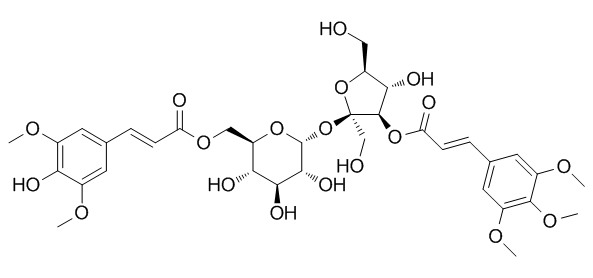Tenuifoliside C
Tenuifoliside C is a target lactate dehydrogenase inhibitor, it significantly inhibits chlorzoxazone 6-hydroxylation catalyzed by CYP2E1.
Inquire / Order:
manager@chemfaces.com
Technical Inquiries:
service@chemfaces.com
Tel:
+86-27-84237783
Fax:
+86-27-84254680
Address:
1 Building, No. 83, CheCheng Rd., Wuhan Economic and Technological Development Zone, Wuhan, Hubei 430056, PRC
Providing storage is as stated on the product vial and the vial is kept tightly sealed, the product can be stored for up to
24 months(2-8C).
Wherever possible, you should prepare and use solutions on the same day. However, if you need to make up stock solutions in advance, we recommend that you store the solution as aliquots in tightly sealed vials at -20C. Generally, these will be useable for up to two weeks. Before use, and prior to opening the vial we recommend that you allow your product to equilibrate to room temperature for at least 1 hour.
Need more advice on solubility, usage and handling? Please email to: service@chemfaces.com
The packaging of the product may have turned upside down during transportation, resulting in the natural compounds adhering to the neck or cap of the vial. take the vial out of its packaging and gently shake to let the compounds fall to the bottom of the vial. for liquid products, centrifuge at 200-500 RPM to gather the liquid at the bottom of the vial. try to avoid loss or contamination during handling.
Mediators Inflamm.2016, 2016:7216912
Front Immunol.2018, 9:2091
Plant Methods.2017, 13:108
Food Chem.2023, 404(Pt A):134517.
Oncol Lett.2020, 20(4):122.
Environ Toxicol.2023, tox.23999.
Institut Pasteur Korea2020, doi: 10.21203.
Chem Biol Interact.2019, 298:1-7
Food Hydrocolloids2024, 156:110345
FUTURE VIROLOGYVOL.2023, 18(5).
Related and Featured Products
Zhongguo Zhong Yao Za Zhi. 2017 Aug;42(16):3167-3177.
Analysis of influencing factors of secondary metabolites contents in cultivated Polygala tenuifolia.[Pubmed:
29171237]
This work was launched to explore the effect of habitat and growth year on the secondary metabolites contents of cultivated Polygala tenuifolia.
METHODS AND RESULTS:
The samples of cultivated P. tenuifolia were analyzed by ultra-high performance liquid chromatography(UPLC)-quadrupole time-of-flight mass spectrometry(Q-TOF MS), and the obtained data were analyzed using multiple statistical analysis and cluster analysis. The results showed that compared with growth year, habitat is a main influencing factor which affected the secondary metabolites contents of P. tenuifolia. The contents of sucrose esters and oligosacchride multi-esters are greatly dependent on the habitat (the sample-AG with high levels of components of tenuifoliside B and Tenuifoliside C, and the sample-FY with high levels of 3,6'-disinapoyl sucrose, tenuifoliose S, tenuifoliose L, and tenuifoliose V). There is no obvious effect of habitat and growth year on xanthone. The contents of triterpene saponins are greatly dependent on the growth year, and the content of parts of triterpene saponins increased as time goes on.
CONCLUSIONS:
The result indicated that the effect of habitat and growth year on different types of secondary metabolites is not completely equivalent. This study will contribute to the breeding of P. tenuifolia and amendment of current commodity criteria.
Zhongguo Zhong Yao Za Zhi. 2014 Nov;39(22):4459-63.
Effect of oligosaccharide esters and polygalaxanthone Ill from Polygala tenuifolia willd towards cytochrome P450.[Pubmed:
25850285]
METHODS AND RESULTS:
Five compounds (Tenuifoliside C, tenuifoliside D, telephiose A, telephiose C and polygalaxanthone III) from polygala tenuifolia wild were incubated together with CYP probe substrate in human liver microsomes to investigate the inhibitory effect towards CYP450 enzyme. Phenacetin (CYP1A2), coumarin (CYP2A6), paclitaxel (CYP2C8), diclofenac (CYP2C9), S-mepheriytoin (CYP2C19), dextromethorphan (CYP2D6), chlorzoxazone (CYP2E1), midazolam (CYP3A) were selected as the isoforfn specific substrate. And the formation of paracetamol, 7-hydroxycoumarin, 6alpha-hydroxy paclitaxel, 4'-hydroxydiclofenac, dextrorphan, 6-hydroxychlorzoxazone, 1'-hydroxymidazolam, 4'-hydroxymephenytoin were detected respectively to measure the effect towards CYP450 by high-pressure liquid chromatography (HPLC).
CONCLUSIONS:
The result shows that five compounds from polygala tenuifolia willd significantly inhibit chlorzoxazone 6-hydroxylation catalyzed by CYP2E1, while showed no effect towards CYP1A2, CYP2A6, CYP2C8, CYP2C9, CYP2C19, CYP2D6, CYP3A. And IC50 value was 38.73, 54.14, 61.77, 62.22, 50.56 micromol x L(-1), respectively.
J Sep Sci. 2017 Mar;40(6):1385-1395.
Bioactivity screening, extraction, and separation of lactate dehydrogenase inhibitors from Polygala tenuifolia Willd. based on a hyphenated strategy.[Pubmed:
28134488]
Stroke is the second leading cause of death worldwide. Lactate dehydrogenase inhibitors are currently widely used in the treatment of ischemic stroke, and natural products are considered promising sources of lactate dehydrogenase inhibitors.
METHODS AND RESULTS:
In this study, ultrafiltration liquid chromatography coupled with mass spectrometry was used for the screening and identification of lactate dehydrogenase inhibitors from Polygala tenuifolia. Furthermore, five lactate dehydrogenase inhibitors, sibiricose A5, 3,6'-di-O-sinapoyl-sucrose, glomeratose A, tenuifoliside B, and Tenuifoliside C, were selected as target lactate dehydrogenase inhibitors. In addition, the five target compounds with purities of 96.45, 97.65, 96.38, 94.34, and 93.29% were extracted and isolated using a new hyphenated strategy of microwave-assisted extraction coupled with countercurrent chromatography with a two-phase solvent system of n-hexane/n-butanol/ethanol/water (5.321:1.00:1.664:6.647). The bioactivities of the isolated compounds were analyzed using PC12 cells and the 3-(4,5-dimethylthiazol-2-yl)-2,5-diphenyltetrazolium bromide assay.
CONCLUSIONS:
The results also demonstrated that microwave-assisted extraction coupled with countercurrent chromatography is an efficient method of isolating chemical constituents from medicinal herbs. Moreover, the research route consisting of activity screening, extraction, separation, and activity verification of the compounds has the advantages of being efficient, orientated, and objective.



